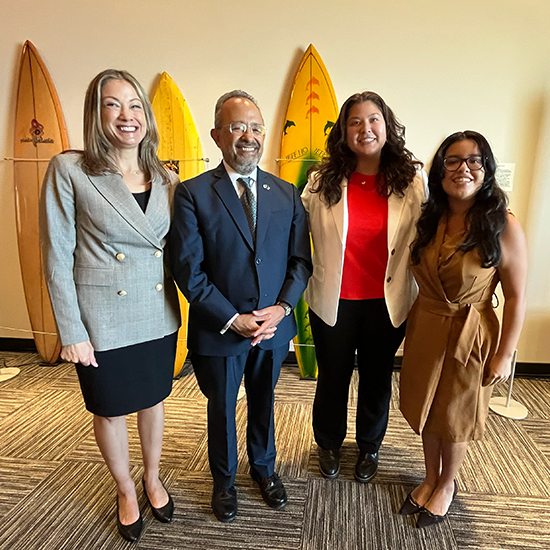Building Together: A Visit From the Los Angeles Mexican Consul-General Carlos González Gutiérrez

In honor of Hispanic Heritage Month, the School of Public Policy Diversity and Belonging Committee and the Provost Office hosted the Mexican consul general of Los Angeles, Ambassador Carlos González Gutiérrez, on October 6th at the Pepperdine campus.
School of Public Policy professor Luisa Blanco was critical in bringing together Pepperdine departments to make the lunch event possible. During her opening remarks, Blanco shared, “I am a proud Mexican American, I have a dual nationality, and I recognize how Mexico and the United States have shaped my experience. I am very thankful to both countries.”
“Trade and immigration policies between the United States and Mexico are central to their economies and to the well-being of the citizens of both countries," continued Blanco. “Policies that are put in place today not only affect us but will have lasting effects on future generations. For that reason, today’s conversation is vital.”
The ambassador shared information about the current state of US-Mexico relations, covering both economic aspects and the ongoing immigration situation. The ambassador described the trade impacts that US-imposed tariffs will have on the trade agreement USMCA (formerly the North American Free Trade Agreement, NAFTA). In his presentation, González Gutiérrez emphasized that “we, the United States and Mexico, don’t just trade or buy things from each other, we build things together.” The Mexico-California trade relationship consists most frequently of auto parts, semiconductors, and medical equipment. The ambassador shared that California is Mexico's top export destination, with $1.5 million in goods crossing the border every minute.
He further emphasized that trade and immigration are beneficial in the long term for sustaining the diplomatic relationship between the two countries and, most importantly, for maintaining a healthy economy. In 2024, the US-Mexico trade amount reached $799 billion. However, with the Trump administration’s threats to impose tariffs, he reminded the audience that 80% of tariff costs are paid by US consumers and companies. These tariffs would raise consumer prices by 1.8% and increase uncertainty in the United States, meaning investments, jobs, and innovation would slow.
Pivoting to national security, he explained that the relationship between the US and Mexico remains considerably strong, thanks to both countries' efforts in national security, as they align in protecting each other from organized crime and human trafficking.
During the question-and-answer session, a graduate student asked for advice for their communities during difficult times with increased pressure on immigration and ICE raids.
He responded that information should always be verified and citizens must not spread misinformation. “We must understand that immigrants are people with families,” the ambassador reminded the audience. He shared how the Mexican consulate in Los Angeles has been able to interview 929 Mexican nationals who are being held in ICE detention facilities; 40% have already been deported, and 3% have been able to get their freedom, either because they could afford bail or immigration and customs enforcement changed their mind. Among the interviewed people, more than 50% have established roots in the United States for at least one decade, and 77% of them have no criminal record.
Overall, the event served as an important conversation, enriching perspectives on various topics and building connections with Ambassador González Gutiérrez, whose dedication should be applauded for supporting Mexican-Americans and Mexican immigrants, specifically within the Los Angeles community.